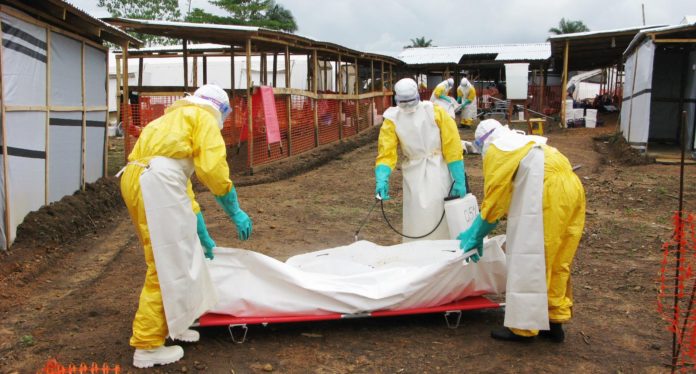
There may be signs of progress in Liberia, but the Ebola epidemic in West Africa is getting worse — not better — and it’s going to take a lot more work to control it, United Nations officials said Friday.
Concerted efforts might be able to end it by the middle of next year, U.N. Secretary-General Ban Ki-Moon told a press conference, but the current trajectory makes that possibility less likely each day.
“There has been some welcome progress,” Ban said. However, he added, “the results are uneven [and] the rate of transmission continues to worsen.”
Three top international leaders — Ban, World Health Organization director-general Dr. Margaret Chan and World Bank president Jim Yong Kim — used uncharacteristically strong language to urge more cooperation, coordination and a faster, sustained international response to the epidemic.
‘End game is not near’
WHO released new statistics on Ebola that show “intense” transmission in Guinea, Liberia and Sierra Leone. “There have been 15,351 reported Ebola cases in eight countries since the outbreak began, with 5,459 reported deaths,” WHO said.
And all six people infected with Ebola in Mali have now died. “The new chain of transmission in Mali is of deep concern,” Ban said. WHO and other health experts are tracking close to 500 people who may have been exposed in that outbreak, which is linked to a religious leader from Guinea who died after traveling to Bamako from Guinea.
“There’s clear evidence of areas of progress, particularly in Liberia, where new cases have declined significantly. International support is making a difference,” said Kim. “But there’s also evidence that is very worrisome, such as the increase in infections in Sierra Leone and the spreading of the outbreak to Mali.”
“This epidemic is not close to being over. Our end game is not near,” Kim added.
In Liberia, health leaders report some success with so-called safe burials. The bodies of people who have died from Ebola are extremely infectious and many people have caught the virus from handling the bodies of loved ones. As more people accept the need for strict funeral practices, infection rates have fallen.
Yet the virus continues to outpace efforts to fight it.
“If we continue to accelerate the response, we can contain and end the outbreak by the middle of next year,” Ban said. Yet even if that’s possible, that will mean the outbreaks and then the epidemic will have lasted longer than a year.
‘We must get to zero cases’
Until now, outbreaks of Ebola have been stopped within weeks and after at most a few hundred cases. And a concurrent outbreak in the Democratic Republic of Congo, which has seen Ebola several times in the past, was officially declared over Friday after 66 cases.
But the West African outbreak started in remote areas where three countries border one another, where people were not aware of Ebola. A very slow response — both locally and internationally — coupled with long-standing social and economic problems allowed a series of outbreaks to turn into an epidemic of unprecedented magnitude.
“[O]ur goal will be extraordinarily difficult: We must get to zero cases,” Kim said. “Ebola is not a disease where you can leave a few cases and say you’ve done enough; look what happened in the early days of this epidemic, when it fell in Guinea and then exploded into Liberia and Sierra Leone.”
It’s far too early to become complacent, WHO’s Chan said, adding that she is also concerned about stopping the outbreak in Mali. “We must smother this little fire … before it gets out of control,” she said. “I am confident that if we work together as one, we will be able to bring this outbreak under control.”
At the same time, the three leaders said, the international community must start work now to rebuild the three hardest-hit countries.
“Even as we focus intensely on the immediate health response, we also must begin planning to help the affected countries back on the road to economic recovery and development,” the World Bank’s Kim said. “As soon as possible, we need to get children back in school, farmers back in their fields, businesses back up and running, and investors back into these countries. “
